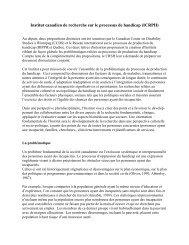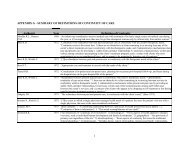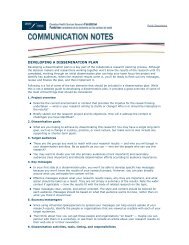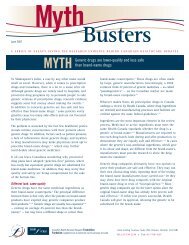Full Report
Full Report
Full Report
You also want an ePaper? Increase the reach of your titles
YUMPU automatically turns print PDFs into web optimized ePapers that Google loves.
MENTAL<br />
HEALTH<br />
Current care<br />
Since implementation, staff have identified positive<br />
changes related to the standardization of care, an<br />
increase in communication and follow-up, and<br />
improved client referral. Overall, staff have noted they<br />
are more confident in their jobs and are more aware of<br />
how to support their clients. The project was also seen<br />
as a positive networking exercise, improving communication<br />
and relationships among colleagues in various<br />
locations. As one staff noted, “the most important piece<br />
is that now there is a dedicated process. If there is an<br />
issue, you know who to call.”<br />
The project has increased dialogue among<br />
healthcare staff and helped raise awareness<br />
around mental health processes.<br />
Clear support<br />
Despite various project challenges, staff at the pilot<br />
sites have voiced strong support for the expansion<br />
of this work across NWT. Staff believe standardized<br />
pathways will facilitate faster and more efficient care,<br />
improve communication, promote team approaches,<br />
increase clients satisfaction, reduce re-admission rates<br />
and shorten hospital stays.<br />
The pilot project has increased dialogue among<br />
healthcare staff and helped raise awareness around<br />
mental health processes. Perhaps more important, the<br />
project has instilled a greater understanding of change<br />
management within the department and underscored<br />
how complex the process can be. As one staff noted<br />
about the prospect for positive change, “The project<br />
gave me confidence that it is possible here.”<br />
In June 2013 the Department released A Shared Path<br />
Towards Wellness, an action plan that will guide mental<br />
health and addiction services for the next three years.<br />
Within this report, the Department has committed<br />
to using the mental health pathways throughout<br />
NWT – clear support for the scale and spread of work<br />
carried out under the mental health IP.<br />
Considerations for sustainability<br />
and integration<br />
Pilot and improvement team members have<br />
brought forward a number of considerations to<br />
support the integration and long term sustainability<br />
of the pilot projects:<br />
• Given its broad applicability, the mental health toolkit<br />
should be adapted to support improved treatment<br />
of other chronic diseases.<br />
• The Department should dedicate financial and human<br />
resources to support not only appropriate training and<br />
orientation of all staff on the mental health tools, but<br />
also the further spread of the tools throughout NWT.<br />
Further education initiatives should include creation<br />
of a standard, easy-to-use orientation toolkit for use<br />
in each community, as well as annual or bi-annual<br />
re-training for all associated staff.<br />
• Staff identified case management practices and interdisciplinary<br />
care as critical to further improvement<br />
of mental health services; therefore, the Department<br />
should continue to foster opportunities to formalize<br />
and implement these practices, which support<br />
relationship building and better flow of information<br />
between providers.<br />
• The Department must prioritize efforts to clarify and<br />
ensure staff are fully informed of policies, guidelines,<br />
and practices concerning client confidentiality and<br />
consent to share information – particularly among<br />
inter-branch and inter-departmental service providers<br />
and external health authorities.<br />
• Because mental health services cross multiple<br />
sectors, efforts to sustain or expand the work of the<br />
project should include community level stakeholders<br />
and representatives from housing, education and<br />
justice services to ensure the work benefits from the<br />
insights of the full range of professionals who interact<br />
with mental health clients.<br />
Making the Case for Change<br />
52














